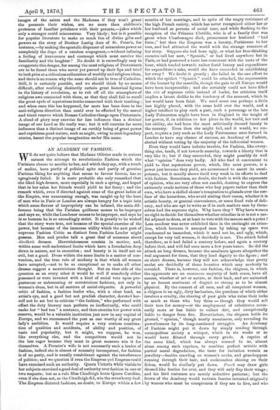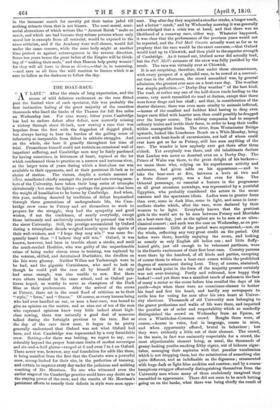AN ACADEMY OF FASHION.
WE do not quite believe that Madame 011ivier made in serious earnest the attempt to revolutionize Fashion which the Tarisians choose to ascribe to her, and which they say, with a touch -of malice, born partly of political spite and partly of genuine earisian liking for anything that seems to favour licence, has so -egregiously failed. It is more probable she only remarked that ahe liked high dresses, more especially in such a spring, and hoped that in her salon her friends would yield to her fancy ; and the remark which, even if directed against some of the great ladies of the Empire, was unassuming enongh, was caught up by the host -of men who in Paris or London are always hungry for a topic into which some flavour of impropriety can be infused, the main dif- ference being that the Parisian quillman means to be improper and says so, while the Londoner means to be improper, and says he is so because he is so exceedingly strict. It is greatly to be wished that the story were true, not because of the special exercise of the power, but because of the immense utility which the new post of supreme Fashion Critic as distinct from Fashion Leader might possess. Men and prudes talk a great deal of nonsense about
• -decolleta dresses. Meretriciousness consists in motive, and, within some well-understood limits which have a foundation deep -down in nature, not in execution ; and beauty is in itself not an -evil, but a good. Dress within the same limits is a matter of con- vention, and the true rule of modesty is that which all women 'have accepted,—not to be so exceptional as to make all other 'dresses suggest a meretricious thought. But on that side of the -question as on every other it would be well if somebody either ,possessed or were invested with a kind of social veto upon pre- posterous or unbecoming or meretricious fashions, not only in -women's dress, but in all matters of social etiquette. A powerful 'critic of fashion, a fashion leader who, with a clear head, an • artist's eye, and a good but not prudish character, devoted her- -self not to set but to criticize "the fashion," who performed with -effect the duty literary men perform so ineffectually, who could -make her "bad ton" a sentence, and then exercise her power with ;reserve, would be a valuable institution just now in any capital of _Europe, and we recommend the post as one worthy of any great .lady's ambition. It would require a very curious combina- tion of qualities and accidents, of ability and position, of taste and popularity, but it might, we suppose, be won, dike everything else, and the competitors would not be the less eager because they must in great measure win it for themselves. A Premier's wife is not necessarily such a leader of 'fashion, indeed she is almost of necessity incompetent, for fashion is of no party, and is usually recalcitrant against the interference of politics; and we question if even the Empress qua Empress could have exercised such an authority. Queen Victoria while visible to her subjects exercised a good deal of authority over fashion in one or two respects; but as a rule Miss Chudleigh beats Queen Caroline, -even if she does not, as the Chudleigh did, win the strawberry-leaf. 'The Empress dictated fashions, no doubt, to Europe within a few months of her marriage, and in spite of the angry resistance of the high French society, which has never recognized either her or her husband as persons of social tone, and while flocking to the reception of the Princess Clotilde, who is of a family that was great when Charlemagne died, pronounces her husband "bad form ;" but then the Empress was a beauty, Parisienne to her toes, and had attracted the world with the strange romance of her story. Suppose she had been ugly, or what her free-thinking enemies call her now, "Spanish," or had lived anywhere but in Paris, or had possessed a taste less consonant with the taste of the hour, which tended towards rather florid luxury and expenditure for expenditure's sake, would she have succeeded in establishing her sway ? We doubt it greatly ; she failed in the one effort to which the epithet "Spanish" could be attached, the supersession of the bonnet by the mautilla, though the gain to all Europe would have been inexpressible ; and she certainly could not have filled the rule of supreme critic instead of leader, for criticism itself implies a latent dislike to the tendency of the moment, which in her would have been fatal. We need some one perhaps a little less highly placed, with the same hold over the world, and a higher intellect to play such a part, such a personage as the late Lady Palmerston might have been in England in the height of her power, if, in addition to her place in the world, her tact and her ability, she had been the most artistically dressed beauty in the country. Even then she might fail, and it would, we sus- pect, require a jury such as the Lady Patronesses once formed in London to have any chance of success, an Academy of Fashion, elected without voting by the majority of the influential women.
Even they would have infinite trouble, for Fashion, like every- thing else, tends, if not towards anarchy, towards a liberty that is very like it; but if they succeeded, they might possibly do well what " opinion " does very badly. All who find it convenient to yield to that mysterious power, which, like most powers, is a power just because they yield, are accustomed to assert its omni- potence, but it usually shows itself very weak in its efforts to deal with fashion. Sometimes, no doubt, the fault is with the exponents of opinion, who are very often not candid, desiring to express the extremely crude notions of those who buy papers rather than their own, who have a skilled skater's temptation to glissade over the sur- face of the hazardous, who avoid stating their canon, whether it is artistic beauty, or general convenience, or some fixed rule of deli- cacy, and who are apt to write as if in such matters men by them- selves had the supreme right. Why have they ? Why have women no right to decide for themselves whether crinoline is or is not a use- ful adjunct to dress, or at least to vote with the =non such a point ? Less candour was never exhibited than in the onslaught on crino- line, which because it annoyed men by taking up space was condemned as immodest, which it need not be, and ugly, which, except for very tall women, it decidedly is not. The attack failed therefore, as it had failed a century before, and again a century before that, and will fail once more a few years hence. So did the attack on long dresses, because the assailants ignore altogether the real argument for them, that they lend dignity to the figure ; and on short dresses, because they will not acknowledge that pretty ancles are decidedly of those beauties which may modestly be revealed. There is, however, one fashion, the chignon, in which the opponents are an enormous majority of both sexes, have all canons, whether of art or nature, at their back, and are animated by an honest sentiment of disgust so strong as to be almost physical. By the consent of all men, and all competent women, a chignon is an ugly, dirty barbarism, the purchase of which either involves a cruelty, the shaving of poor girls who value their locks as much as those who buy them — though they would sell their toes for money—or the employment of substitutes neces- sarily more or less liable to collect dirt, and exceptionally liable to danger from fire. Nevertheless, the chignon holds its ground, "opinion," though nearly unanimous, only revealing its powerlessness by its long-continued struggles. An Academy of Fashion might put it down by simply sending through cosmopolitan society a whisper, which in six weeks or so would have filtered through every grade. A caprice of the same kind, which has always seemed to us, almost alone among such caprices, to combine perfect artistic with partial moral degradation, the taste for imitation vermin as jewellery—beetles crawling on women's necks, and grasshoppers running through their hair, and cockroaches shining on their fichus, would be similarly put down. Punch may draw girls dressed like beetles for ever, and they will only flap their wings ; and his bird costumes are merely seductive patterns ; but the frown of the Academy would restrain fancies invented originally by women who must be conspicuous if they are to live, and who in the incessant search for novelty get their tastes jaded till nothing attracts them that is not bizarre. The semi-moral, semi- social aberrations of which writers like " Azamat Batuk " make so much, and which are bad because they release persons whose only moral law is example from all restraint, would be exposed to the same criticism, and if the Academy were well chosen, would fall under the same censure, while the same body might at another time protect us against extravagances in the reverse direction. Some ten years hence the great ladies of the Empire will be think- ing of "making their souls," and then Heaven help pretty women ! for they will all have to dress as devotes,—that is, in mourning, —and save us all from the wild reaction to licence which is as sure to follow as the darkness to follow the day.



































 Previous page
Previous page